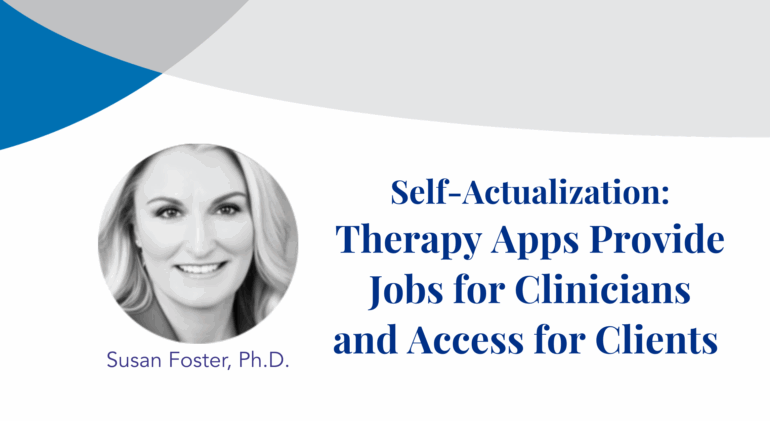In just five years, telehealth has gone from a sudden necessity to a multibillion-dollar industry that millions depend upon. There have long been apps that utilize behavioral modification, like Noom for weight loss and quitSTART for quitting smoking, but apps that offer live sessions with a licensed therapist on your smartphone are a newer development. Insight asked Susan Foster, Ph.D., associate dean of the College of Graduate Professional Studies, about the advantages and potential concerns surrounding app-based therapeutic options for clinicians and their clients.
For the most part, she’s all in. “In a world where there are systemic barriers to care, the ease of access makes app-based therapeutic modalities appealing,” Dr. Foster says, adding, “Studies have shown that outcomes for individuals in online therapy are comparable to in-person sessions.”
The Advantages of Therapy Apps
Ease of use. For individuals seeking behavioral therapy for the first time, an app can prompt them to a compatible therapist, set up a session, and connect to a professional from wherever they are. “App-based options are also opening up therapy to individuals who wouldn’t otherwise seek it,” Dr. Foster says.
Overcoming stigma. For a significant number of people who worry that they will be judged for needing mental health care. For these individuals, apps allow them to speak with a therapist without having to enter an office, and for whom an app-store-approved download may suggest mainstream acceptability.
Access from afar. The greatest advantage of telehealth is the ability to connect remotely to mental health services. Telehealth is invaluable to those who live in remote areas or for even those who live in urban areas where, Dr. Foster says, “Some therapists’ waiting lists are months long. Similarly, for some therapists who have specialty areas, their clients can connect with these services, even when they do not live nearby.”
Some Concerns About App-Based Therapy
Limited information about providers. Clients who connect with the therapists through apps may have less information about their therapist before beginning sessions than they would with a conventional provider, though the apps make it easy to switch if you are not compatible.
Do they take insurance? The biggest concern among users is insurance. BetterHelp, the largest online provider, does not accept insurance, and the processes for those who do take insurance can be cumbersome. Individual providers will want to know the apps’ terms of service before signing on.
Are the therapists supervised? Those considering engaging in app-based therapy should be sure the companies comply with the regulations in their state, including rules applying to supervision. “That’s going to be the disclaimer: If you are a therapist using an app, make sure you have appropriate training and supervision,” Dr. Foster says.
The most important takeaway is that app-based therapy is here to stay. More individuals will seek therapy through apps, and clinicians will be connecting through their phone more than ever. “I have a colleague with 20 years of experience; this accounts for 60 to 70% of her practice,” Dr. Foster says.
For more information about any of the programs at The Chicago School, please fill out the information form below.

